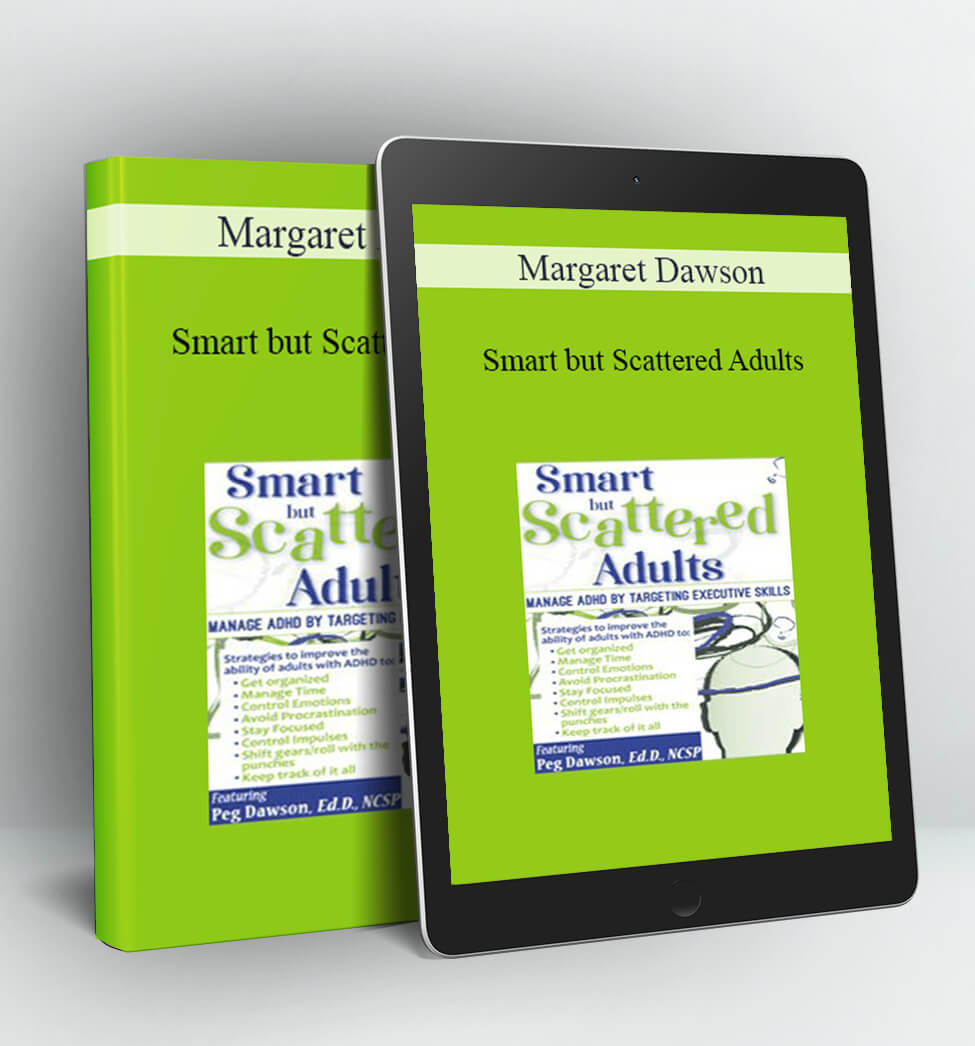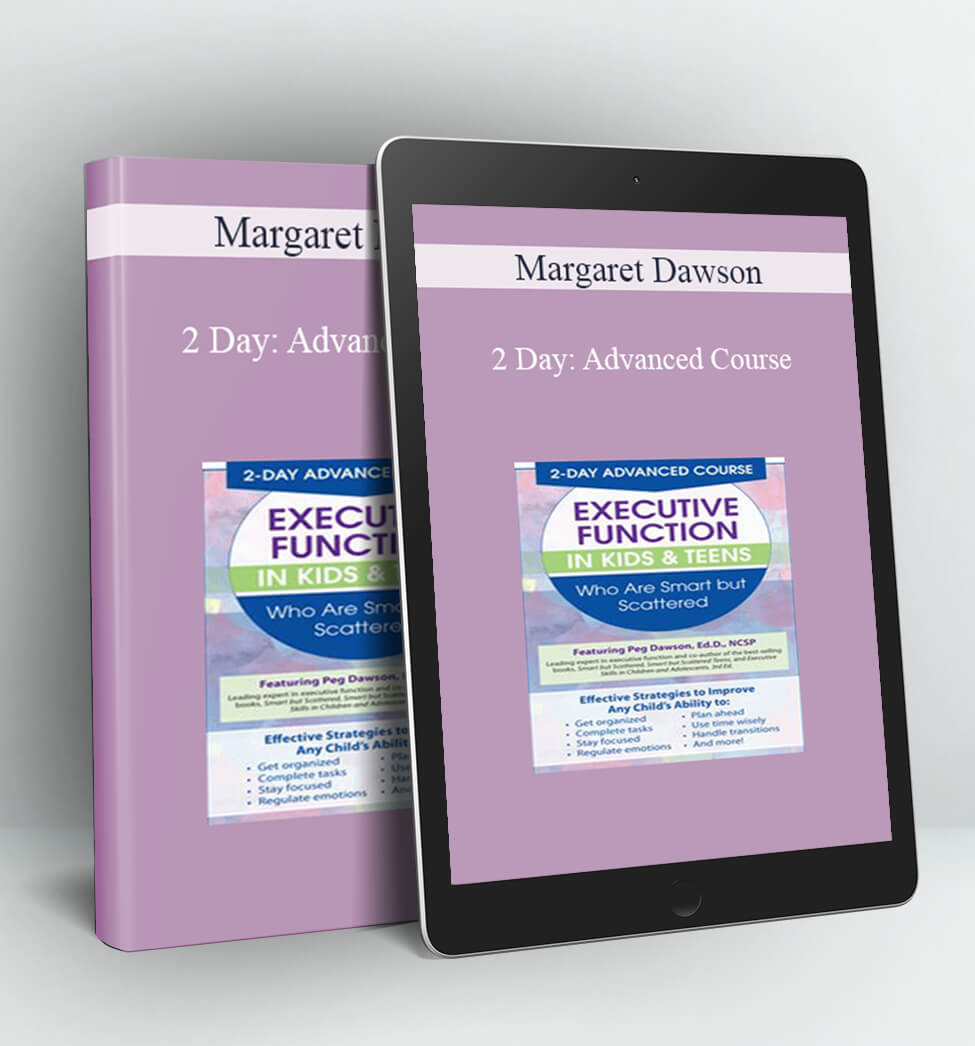Executive Dysfunction at Home and at School – Margaret Dawson
- Faculty:
- Margaret Dawson
- Duration:
- 6 Hours 25 Minutes
- Format:
- Audio and Video
- Copyright:
- Feb 26, 2020
Description
Children who have deficient executive skills often have trouble getting started on tasks, get distracted easily, lose papers or assignments and forget to hand in homework. They make careless mistakes, put off work until the last minute and have no sense of time urgency. Workspaces are disorganized and teachers often refer to their backpacks or lockers as “black holes.” Often considered chronic underachievers, these children are at risk for academic failure as well as emotional and behavioral difficulties.
Dr. Dawson, co-author of the best-selling books Executive Skills in Children and Adolescents, 3rd Ed. (2018), Smart but Scattered (Guilford, 2009) and Smart but Scattered Teens (2013, Guilford) uses case examples along with interactive discussion to demonstrate how the executive skills manifest in daily home and school activities. Learn how to assess these skills and take home evidence-based strategies to help children and adolescents overcome executive skills weaknesses.
Finish this recording with a set of tools that includes strategies for task/environmental modifications, skill development through cognitive/behavioral techniques and creation of incentive systems. You will be able to give teachers and parents a means for developing and improving the following:
- Organization
- Time management
- Impulse control
- Goal-directed persistence
- Executive skills critical for independent functioning
Handouts
| Manual – Executive Dysfunction at Home and at School (3.02 MB) | 59 Pages | Available after Purchase | |
| Illinois Educators Self-study Instructions (28.5 KB) | Available after Purchase | ||
| Illinois Educators Evaluation Form (1.2 MB) | Available after Purchase |
Outline
Executive Skills
- Underlying theory
- Executive skills in the context of brain function and child development
- Limitations of the research and potential risks
Assessment of Executive Skills
- Parent/teacher/student interviews
- Behavior rating scales
- Observations
- Informal assessment
- Formal assessment
Intervention Strategies
- Environmental modifications to reduce the impact of weak executive skills
- Teaching strategies to help children develop/improve executive functioning
- Using incentives to help practice or use skills that are difficult
Keys to Effective Intervention Design
- Match the child’s developmental level
- Use the child’s innate drive for mastery and control
- Begin with environmental modifications
- Effortful tasks and ways to make them less difficult
- Use incentives to augment instruction
- Provide the minimum support necessary
- Apply supports and interventions until the child achieves mastery or success
- Gradually fade supports, supervision, and incentives
Coaching: An Effective Strategy for Building Executive Skills
- Description of 2-stage process
- Coaching with younger children
- Clinical case examples
- Research studies supporting the efficacy of coaching
Faculty

Margaret Dawson, Ed.D., NCSP Related seminars and products: 11
Peg Dawson, Ed.D., NCSP, is a school psychologist and for over 20 years has worked at the Center for Learning and Attention Disorders in Portsmouth, New Hampshire, where she specializes in the assessment of children and adults with learning and attention disorders. She is co-author of the bestselling books on executive dysfunction, Executive Skills in Children and Adolescents: 2nd Edition (Guilford, 2010), Smart but Scattered (Guilford, 2009) and Smart but Scattered Teens (Guilford, 2013).
Peg is a past editor of Communiqué, the newsletter of the National Association of School Psychologists, and has published numerous articles and book chapters on a variety of topics, including retention, ability grouping, reading disorders, attention disorders, the sleep problems of adolescents, the use of interviews in the assessment process, and homework.
Peg has many years of organizational experience at the state, national and international levels and served in many capacities, including president of the New Hampshire Association of School Psychologists, the National Association of School Psychologists (NASP) and the International School Psychology Association.She has also participated in many of NASP’s leadership initiatives, including the Futures Conference and the development of both the second and third Blueprint for the Training and Practice of School Psychology. She is the 2006 recipient of NASP’s Lifetime Achievement Award. Peg received her doctorate in school/child clinical psychology from the University of Virginia.
Speaker Disclosures:
Financial: Margaret (Peg) Dawson is an author for Guilford Press and receives royalties. She is an author for Amacon publishers and receives royalties. She receives a speaking honorarium from PESI, Inc.
Non-financial: Margaret (Peg) Dawson has no relevant non-financial relationships to disclose.
Access Download Executive Dysfunction at Home and at School – Margaret Dawson right now!
Delivery Method:
After your purchase, you’ll get access to the downloads page. Here, you can download all the files associated with your order.
Downloads are available once your payment is confirmed, we’ll also send you a download notification email separate from any transaction notification emails you receive from Vinlearn.






